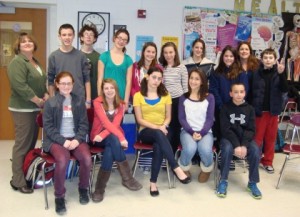By Lori Berkey, Contributing Writer

Shrewsbury – Francesca Oddo has witnessed a peer get upset over an argument with another student. Oddo, a seventh-grader at Oak Middle School (OMS) in Shrewsbury, wants to help fellow students resolve conflicts peacefully. She's one of 16 OMS students who completed training last fall to become a Students Talk and Resolve (STAR) peer mediator.
The STAR program was started at the school seven years ago by OMS health teacher Kim Nikula, who was previously the mediation coordinator at Burncoat High School in Worcester. She and Kathy Harmon, an aide at OMS, are the program's co-advisors.
According to Nikula, one goal is to provide a service to students who may be in conflict by providing a safe place away from the audience in the hallway or cafeteria while being able to discuss the conflict in a setting with trained students who can help them hear each other out and develop a solution. Criteria for being a peer mediator include being a good listener, having a desire to help, having good problem-solving skills and being able to keep information confidential.
Referrals are directed to Nikula. She does an intake before assigning a mediator in order to assess that both students are there voluntarily and that it's not a bullying situation with an unequal balance. Cases of bullying are not handled by student mediators, but are dealt with elsewhere.
Eighth-grader Jason Staples is in his second year as STAR mediator. He said he's experienced conflict in school himself, and wanted to help improve life at school.
“The reason I joined really was I's sick of seeing all the conflict in the schools and I wanted to help get rid of it,” he said.
Gina Caputo, a seventh-grader, said she signed up to be a peer mediator because her brother had participated and told her it was a good group who tried to help people.
“I thought that would be a good experience because it was my first year at Oak and I kind of want to do something good,” she said. Caputo thinks everyone's experienced hurt feelings before from people's words or actions, and she wants to help stop it.
Participants found the training helpful.
“I learned that as a mediator you'se a neutral force; you'se not supposed to be listening and deciding,” said eighth-grader Michael Wackell. He found out that by asking peers questions and getting them to think about the situation, the process can enable them to arrive at their own solution to their conflict.
Some participants linked their service to long-term goals.
Oddo said she wants to become something like a guidance counselor, and skills she's learning, like being impartial, will be useful.
Eighth-grader Tatiana Karadimitriou believes mediation skills are important in life, not just in school.
“You can help solve your problems and other people's problems by using mediation. A lot of world leaders use it,” she said.
Karadimitriou hopes to help peers understand what it's like to be in the shoes of someone who hears a hurtful comment. A flippant remark about someone's hair looking messy might ruin a person's entire day, she added, while the person who said it hadn's really thought about the effect on the other person.
Harmon said the mediators are helping change the school culture.
“These kids are more apt to stop and pick up someone's pencil case or say, “That's not nice, don's say that,” and I think those little kind gestures they'se doing, it has to have an effect …the bystanders will hear that, and I'se seen it happen and it's just a good feeling.”
















